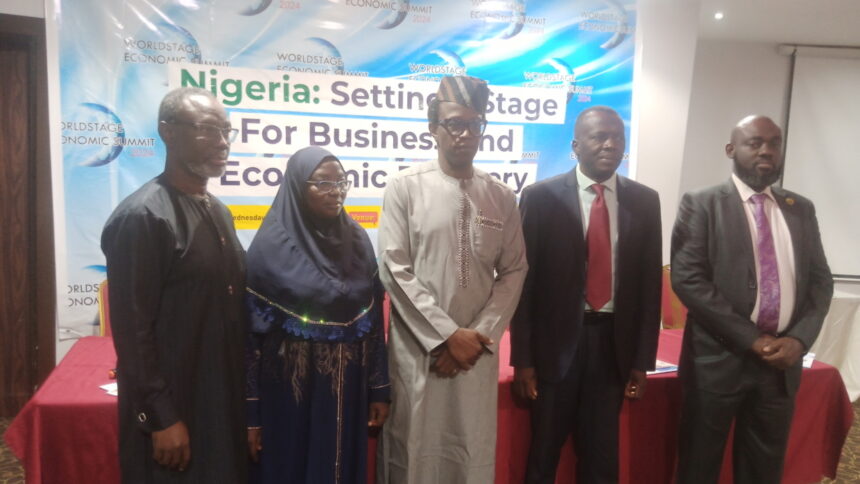The Nigerian Communications Commission (NCC) has hinted that it is working with major stakeholders in the telecoms industry to ensure improved broadband access for Nigerian telecoms subscribers with 25 Mbps minimum speed in urban areas and 10 Mbps in rural areas by 2025.
The Executive Vice Chairman of the commission, Dr. Aminu Maida, made this disclosure in his paper presentation titled ‘NCC’s Vision to Impact Nigeria’s Economic Recovery’ at the WorldStage Economic Summit (WES) 2024 held on Wednesday in Lagos, stressing that the National Broadband Plan (NNBP) 2020-2025 is a major hub of the commission’s strategy.
Maida described broadband as the bedrock of economic recovery, enabling innovation, and fostering economic activities across all sectors.
Represented at the Summit by the commission’s Zonal Controller, Lagos, Mr Tunji Jimoh, the industry regulatory chief maintained that the commission was committed to expanding broadband infrastructure and creating an enabling environment for both local and foreign investments in the telecommunications sector.
Maida described digital transformation as a catalyst for economic growth, which is not a choice but required for the nation’s sustainable economic growth.
He clarified: “To this end, the Commission has been committed to building a robust digital economy that will drive inclusive growth, create jobs, and enhance the competitiveness of Nigerian businesses on a global scale.
“The National Digital Economy Policy and Strategy (2020-2030) of the Federal Government outlines a clear roadmap to achieving these goals, prioritizing broadband penetration, digital literacy, and the development of a vibrant digital ecosystem.
“The Strategic Blueprint of the Honourable Minster of Communications, Innovation and Digital Economy also provides the needed thrust on this journey. The Blueprint is a detailed and progressive framework that encompasses five key pillars: Knowledge, Policy, Infrastructure, Innovation, Entrepreneurship & Capital, and Trade. Knowledge is the cornerstone upon which innovation thrives and is built upon the bedrock of sound policies. Infrastructure provides the essential backbone for a thriving digital economy, while innovation and entrepreneurship drive economic diversification. The trade pillar connotes our commitment to global collaboration and partnerships, recognising that innovation knows no borders.
“Drawing from this this blueprint, the Commission has outlined its Strategic Focus Areas, recognizing that each of its stakeholders – the Consumers, the Licensees and Industry, and the Government – holds a unique perspective and has distinct expectations from the Commission. The Commission’s strategic vision is therefore guided by the objective of meeting the specific expectations of each stakeholder group.
“In line with the Ministerial Strategic Vision Plan, the Commission is deepening the digital terrain by supporting digital economy initiatives of different organizations and institutions across the country. These interventions range from conferences, summits, regional tech gatherings, digital/tech-inclined trainings, and talent hunts to youth entrepreneurship and empowerment programmes. Deliberate efforts have been set to support and participate in timely knowledge sharing events on the digital economy, and workshops on emerging technologies while conducting series of studies on Incubation and Innovation Hubs, Digital Entrepreneurship, Technological Innovations, and Indigenous Content in the Telecommunications Sector amongst others”, the EVC added
He listed several projects and collaborations carried out to drive broadband penetration in the country as including the Expansion of the Internet Exchange Points (IXPs) links, Establishment of the IXPN Data Centre in the North East Region, and Upgrade of Data Capacity of the IXPN Backbone, amongst others.
This is even as he stressed that the Universal Service Provision Fund (USPF), initiatives such as Rural Broadband Initiative and the Accelerated Mobile Phone Expansion Project had led to the extension of high-speed internet access to under-served and un-served telecom subscribers in rural areas of the country.
The EVC confirmed that collaborations with the states on the effective Right of Way (RoW) charges and multiple levies telecommunication companies were grappling with had started yielding the desired results in terms of the deployment of optic fibre across the nation.
Maida added: “We have seen 12 states aligning with the N145 per linear meter RoW charges, and six of these States completely waiving the RoW.
“Other engagements include collaboration with Nigeria Governors Forum (NGF) to further engage States on digital infrastructure development, with Development Partners like the World Bank, United Kingdom Digital Access Programme (sponsors of the Initiative for Digital Inclusion).
“One of the objectives of the Commission is to establish a regulatory framework for the Nigerian communications industry and for this purpose to create an effective, impartial and independent regulatory authority.
“To set the stage for business and economic recovery, the Commission is actively working to create a regulatory environment that promotes fairness, transparency, and competition.
“The Commission understands the importance of inclusivity, and how telecommunications empower small businesses and informal markets, enabling them to grow, compete, and prosper within the global digital economy.
“The NCC is continuously reviewing and updating policies to keep pace with technological advancements and the needs of the market. Robust measures are being put in place to encourage the adoption of emerging technologies such as 5G, Artificial Intelligence (AI), and blockchain to drive efficiency and innovation in various sectors, from agriculture to finance and from health to education.
“It is important to mention that a few months ago, President Bola Ahmed Tinubu signed an Executive Order designating telecommunications infrastructure as Critical National Information Infrastructure (CNII). This Executive Order criminalizes the intentional damage of telecommunications infrastructure thus protecting telecommunication investments and guaranteeing less down time on our networks. The NCC has already begun collaborating with the Office of the National Security Adviser (ONSA) and other relevant stakeholders to implement the CNII Executive Order”, the industry regulator added






